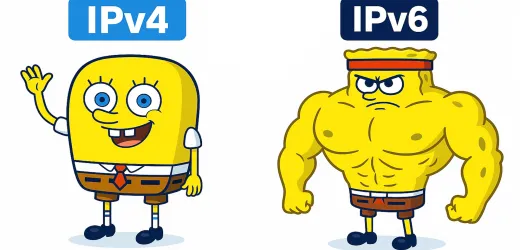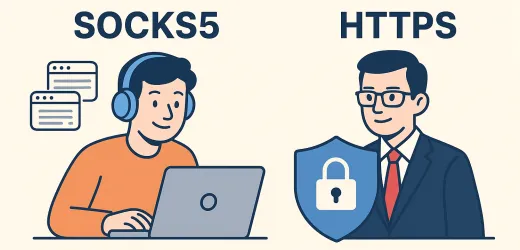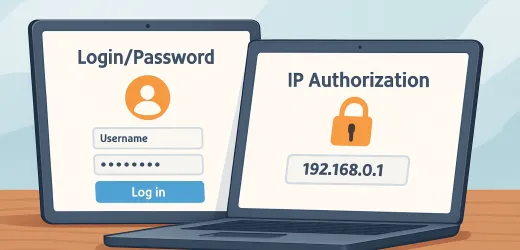When people want to buy a proxy, many wonder which protocol is better, SOCKS5 or HTTPS. While the choice of internet protocol version (IPv4/IPv6) is clear, at least because many providers offer IPv4, the choice between SOCKS5 and HTTPS is less obvious.
Furthermore, there is a lot of conflicting information online, or too much technical detail, which only confuses. We’re here to help, so let’s figure it out together.
Why are SOCKS5 and HTTPS protocols needed?
They are used to deliver requests from you to the server (website) and then deliver the server’s response back to you. To use a real-life analogy, protocols are like a courier delivering packages from one point to another, but in our case, instead of packages, they deliver information.
SOCKS5
SOCKS5 is a protocol that creates a “tunnel” between the client and the server, delivering requests (content) directly without modification or encryption. SOCKS5 is considered a low-level and universal protocol because it supports all types of traffic (TCP, UDP, HTTPS, SMTP, FTP).
In other words, it’s universal and fast, but it doesn’t “understand” the content of requests — it simply routes traffic between you and the server. It also doesn’t encrypt the traffic. You can think of it as a silent courier who doesn’t care what you’re sending — they just deliver the package without asking questions.
HTTPS
HTTPS is a protocol that works only with websites (including their APIs). Its main feature is that it understands the type of request you’re sending, so it knows how to communicate properly with websites. It also encrypts the traffic, which is especially important when you exchange personal information (passwords, bank cards, etc.).
The downside of HTTPS is that it’s slower than SOCKS5 because it processes requests, is considered less anonymous, and works exclusively with websites.
Why not just use SOCKS5 if it's universal?
At this point, you probably still have a lot of questions, wondering why not simply use the SOCKS5 protocol since it’s universal, suitable for both websites and other purposes, faster, and even more anonymous.
And you’re probably wondering how HTTPS can provide encryption yet still be less anonymous than SOCKS5, right?

Don’t worry, we asked ourselves the same questions while preparing this article, and now we have the answers.
-
HTTPS remains the best option for working with websites because it knows how to communicate with them. In other words, when you use an HTTPS proxy for websites, your activity appears more natural and doesn’t raise suspicion, unlike SOCKS5. Moreover, HTTPS is specifically designed for web communication and correctly transmits all necessary data (headers, cookies, etc.).
-
Encryption and anonymity are not the same thing. SOCKS5 is considered more anonymous because it does not inspect the data you send and delivers requests directly without processing. HTTPS is considered less anonymous because it processes your requests before sending them to the website, and its anonymity depends on the configuration and the provider from which you purchased the proxy. In theory, if you buy a proxy from an unscrupulous provider, they could collect information about your actions, which would compromise your anonymity. Therefore, always choose reputable providers.
-
Encryption is important when entering sensitive information on a website. In such cases, HTTPS is preferable because it encrypts the traffic, unlike SOCKS5, when communicating with websites.
Main differences between SOCKS5 and HTTPS
We've already discussed the main differences, so let's now summarize them in a single table.
| Criteria | SOCKS5 | HTTPS |
|---|---|---|
| Layer | Transport (TCP/UDP layer) | Application (HTTP/HTTPS layer) |
| Encryption | No (unless HTTPS is used inside) | Yes (TLS) |
| Data Type | Transmits any traffic (HTTP, SMTP, FTP, P2P, etc.) | Transmits only web traffic (HTTP/HTTPS) |
| Versatility | Universal | Limited to browsers and websites |
| Performance | Faster | Slightly slower |
| Anonymity | More anonymous | Less anonymous |
| Primary Applications | Bots, Software, Games, Messengers, Mobile Apps, P2P, Web Scrapers | Parsers, Multi-Accounting, SEO Tools, Web Scrapers |
Which protocol should I choose?
If you work exclusively with websites, then HTTPS is the better option, as it will raise less suspicion, especially for multi-accounting. In all other cases, choose SOCKS5.
As for web scraping, it depends on how you collect data and which tools you use. If you need to mimic a real user as closely as possible, choose HTTPS. In other cases, SOCKS5 is better since it’s faster.
Where can I get SOCKS or HTTPS proxies?
It’s important to understand that proxies are purchased by proxy type (mobile, server, residential), and both SOCKS and HTTPS protocol versions are available after purchase. This means providers offer both protocols to choose from once you’ve bought the proxy. If you’re not sure which proxies you need, we recommend first reading our introductory article What is a proxy?
You can find a suitable provider in our proxy provider rankings. You can filter proxy providers in the list based on your needs. If you have any questions, feel free to leave a comment!








